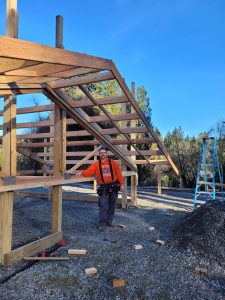Worker Injured During Pole Building Project – Who Pays?
Disclaimer: this article is not to be construed as legal advice, please engage a qualified construction attorney prior to any construction project.
If you don’t take steps to find out in advance whether workers on your new pole building are insured for injuries, you could end up having to cover medical and other costs.
Unless building D-I-Y, new construction calls for bringing in skilled workers who, as part of doing their job, might sustain injuries. Whether you (new building owner)are responsible for a work-related injury has a lot to do with whether the injured worker is employed by your general contractor or a subcontractor, or is employed by you directly.
Virtually all profit-making business employees, and most nonprofit organization employees, are covered by workers’ compensation insurance. This state-run program is funded by employers, and provides medical coverage and other compensation to workers who are injured on the job, regardless of their or their employer’s negligence.
Some states provide limited exemptions allowing certain employers (such as sole proprietors) to opt out of these systems. In most states you can assume, however, anyone working on your building should be (if employed by a licensed general contractor or subcontractor) covered by workers’ compensation.
If you have hired an unlicensed contractor or subcontractor who is not covered by workers’ compensation, it’s a different story. In this situation, you may be deemed to be the employer of any workers who are working on your building at the general contractor’s direction. Regardless of general contractor or subcontractor’s illegal behavior (your state’s law in all likelihood requires a general contractor or subcontractor to be licensed in their respective trades, or as builders or remodelers), you might be liable for a worker’s job-related injuries, regardless of whether your own negligence was a factor in injury or accident.
Any worker (including general contractor) whom you have directly hired to work on your building is your employee, and thus not covered by workers’ compensation insurance. So if you are actually negligent or reckless in, say, maintaining a safe work environment, you might be liable for a worker’s injuries. (Your state’s tort law will dictate nature and your liability extent.)
Moreover, you could be liable for negligence even if workers’ compensation covers workers bringing suit against you. Workers can sue “third parties” for injuries not covered by workers’ compensation, even if they can otherwise claim under Workers’ Compensation. You, potentially, are such a third party; for example, if you were to fail to clear snow and ice from an adjoining sidewalk, causing a worker to slip and sustain injuries.
Ideally, both you and your general contractor will want to have general liability insurance policies in place before the project begins. (Such insurance covers anybody, not just workers on site, and is a normal business expense for a reputable general contractor, who should be willing to show you his or her general liability insurance policy upon request.)
If a bank is financing your building project, it will almost certainly put a general liability insurance policy in place at construction inception. Bank’s policy will cover only the bank, however, so you will want to ask the bank to name you as a covered insured. It should be willing to do so, upon a small fee payment. Otherwise, you will need to deal directly with an insurance agent who represents insurance companies offering policies covering injuries sustained by anyone on a job site.
No prudent builder or new building owner wants to be exposed to a suit for damages, maybe well exceeding the new building’s value. Regardless of whether workers’ compensation covers some or most workers on your building site, and regardless of what kind and how much general liability insurance your bank has in place, it’s wise for you to either secure coverage under the bank’s insurance policy or obtain your own. Also double check on whether your contractors are licensed, and do your best to maintain a safe work site.






